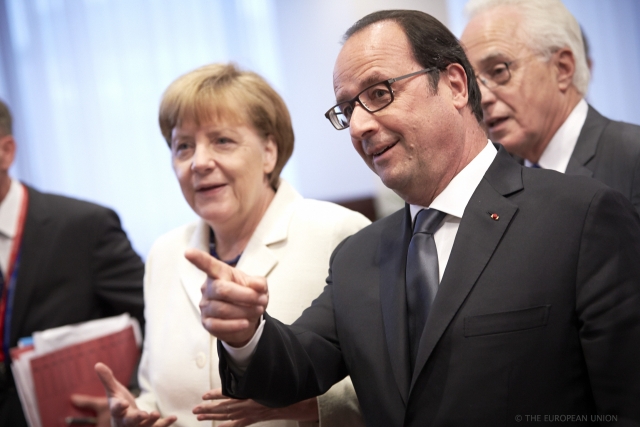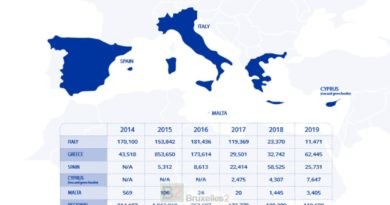France ready to set up an 'avant-garde' for the Eurozone

(B2) In a 'letter to Jacques Delors', published by the Sunday newspaper (JDD), this Sunday (July 19), the French President, François Hollande, calls for a deepening of the Euro Zone. " What threatens us is not the excess of Europe but its insufficiency explains the French president. He proposes a vanguard, to provide the Euro Zone with a budget and a parliament. A necessity, according to him, for Europe both internally and externally.
A vanguard for the Euro
« Sharing a currency is much more than wanting convergence. It is a choice that 19 countries have made because it was in their interest. Moreover, no government for fifteen years has taken the responsibility to get out of it. This choice calls for a reinforced organization and with the countries which will decide on it, a vanguard. France is ready for it ».
Accelerating the tempo, deepening Europe
The enlargement of Europe could not take place without having deepening with differentiated integrations said Jacques Delors. This deepening has not really taken place since Europe went from 15 to 28.
“With Jacques Delors, Europe has expanded, but he warned us by proposing a deepening with differentiated integrations. Let's hear it. Circumstances lead us to accelerate. The euro zone was able to reaffirm its cohesion with Greece this week. »
A budget and a parliament for the Euro Zone
“The quality of the Franco-German relationship has had a lot to do with it. The European spirit prevailed. But we cannot stop there. I proposed taking up Jacques Delors' idea of a euro zone government and adding a specific budget and a parliament to ensure democratic control. »
Inside, a dynamic of conviction of the peoples
This deepening of the Euro Zone obeys an internal necessity. The Greek affair shows that we are at the end of a system which has proved its worth for years (European governance by an advanced elite) but must succeed in transforming itself today to convince the people”.
« The Union cannot be reduced to rules, mechanisms or disciplines. It must convince the peoples that, if it has been capable of preserving peace, it is today the best invention for protecting the values and principles which underpin our common culture, what is called our way of life and which is also our social model. »
Europe expected externally
This European response is necessary because Europe is expected abroad. And it must transform itself into a power capable of acting.
“Faced with globalization and emerging powers, as well as with the risks linked to instability at our borders, coups de force, wars, terrorism, climatic disasters and what they generate with the displacement of populations (.. .) Europe is expected to bring the technologies of tomorrow, promote an industrial model, make a success of the energy and ecological transition, invest in knowledge, reduce territorial disparities, ensure solidarity at home through investments and abroad. outside through development actions. In short, to be able to be a power at the service of the balance of the world. »
Comment: we thus find the French fundamentals of a "powerful" Europe, with an economic government of the Euro Zone. But apart from a few big ideas, nothing very specific. However, a Euro Zone government, with a budget and a parliament, is a pre-federal system, which can come into conflict with the desire of several countries to keep the upper hand in all important matters. We can thus see taking shape - if it is achieved - a confrontation on a European scale, between certain countries - such as the United Kingdom - which want to negotiate a reduction in their obligations and others which want to strengthen the heart of the 'Europe. Will this confrontation be the prelude to a big European 'deal' (a little less Europe for some, a little more for others)?


